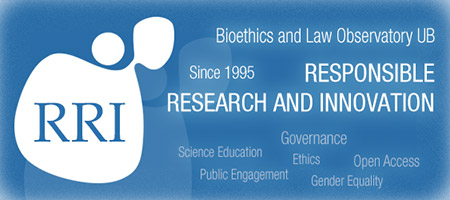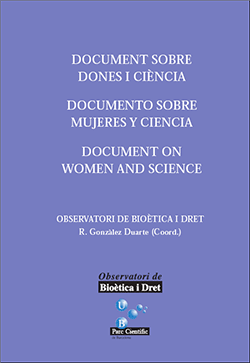The Bioethics and Law Obs.
Master in Bioethics and Law
UNESCO Chair in Bioethics
Contact
- Bioethics and Law Observatory
- UNESCO Chair in Bioethics
- University of Barcelona
- Faculty of Law
- Ave. Diagonal, 684
- 08034 Barcelona
- (+34) 93 403 45 46
- obd.ub@ub.edu
- Master in Bioethics and Law
- (+34) 93 403 45 46
- master.bd@ub.edu
Responsible Research and Innovation (RRI)
 What does Responsible Research and Innovation mean?
What does Responsible Research and Innovation mean?- Bioethics and Law Observatory and Responsible Research and Innovation
– Science Education
– Gender Equality
– Open Access
– Governance
– Ethics
– Public Engagement - Useful Links
What does Responsible Research and Innovation mean?
The concept of RRI ― acronym of Responsible Research and Innovation ― aims at bridging the gap between society and the scientific community by fostering that several stakeholders, (civil society organizations, educational community, scientific community, policy makers and the business and industrial sector), work together during the whole research and innovation process. Thus, it is possible to align the research process and its results with the values, the needs and the expectations of our actual society through cooperation between different stakeholders. Even the concept of RRI was conceived a decade ago, recently has gained more prominence due to its inclusion to the Program Science with and for Society launched by the European Commission within the research strategy of the framework Horizon 2020.
“Research, training, transference of knowledge and outreach activities developed by the research centre Bioethics and Law Observatory (OBD) of University of Barcelona, integrates from its beginning the 6 policy agendas that shapes RRI.”
In this context, RRI comprises 6 policy agendas that should be taken into account during the whole research and innovation process:
- a) Public Engagement, in order to promote that different stakeholders get involved during the whole research process.
- b) Gender Equality, to ensure a better balance between men and women in working groups.
- c) Science Education to enhance educational processes and promote scientific vocations.
- d) Ethics to foster research integrity, with the main goal of prevent and avoid unacceptable research practices.
- e) Open Access to science information, in order to foster collaboration among stakeholders and an open dialogue with society.
- f) Governance, to provide tools to promote shared responsibility among stakeholders and institutions.
These 6 policy agendas are the main keys to tackle actual social challenges through a research and innovation ethically acceptable, socially desirable and sustainable.
The EU Framework Programme for Research and Innovation Horizon 2020 aims at tackling 7 grand challenges in which RRI is a transversal issue:
- Health, demographic change and wellbeing
- Food security, sustainable agriculture and forestry, marine and maritime and inland water research, and the bioeconomy
- Secure, clean and efficient energy
- Smart, green and integrated transport
- Climate action, environment, resource efficiency and raw materials
- Inclusive, innovative and reflective societies
- Protecting freedom and security of Europe and its citizens.
Bioethics and Law Observatory and Responsible Research and Innovation
 Research, training, transference of knowledge and outreach activities developed by the research centre Bioethics and Law Observatory (OBD) of Barcelona University, integrates from its beginning the 6 policy agendas that shapes RRI. Without using the term “RRI”, OBD has been working to bridge the gap between academic and scientific community and society, empowering several stakeholders and promoting interdisciplinary Bioethics and Human Rights research.
Research, training, transference of knowledge and outreach activities developed by the research centre Bioethics and Law Observatory (OBD) of Barcelona University, integrates from its beginning the 6 policy agendas that shapes RRI. Without using the term “RRI”, OBD has been working to bridge the gap between academic and scientific community and society, empowering several stakeholders and promoting interdisciplinary Bioethics and Human Rights research.
“The concept of RRI aims at bridging the gap between society and the scientific community by promoting that civil society organizations, educational community, scientific community, policy makers and the business and industrial sector work together during the whole research and innovation process.”
In particular, OBD has led several research projects related to bioethics training and gender equality within healthcare sector and research. In order to foster a more democratic and transparent society, OBD has promoted since its beginning autonomy, shared responsibility and citizen participation in decision-making in bioethics fields such as healthcare assistance or research. Moreover OBD has worked in the ethical, social and legal impact of scientific and technological advances such as nanoscience and nanotechnology, assisted human reproduction and applications in the field of genetics. Moreover, the documents, reports and declarations of the Opinion Group of the OBD that are published on-line are examples of open access to information and knowledge exchange among university and society as a whole.
Below are mentioned examples of OBD activities within the 6 policy agendas of RRI:
Science Education
OBD understands science education linked to the analysis of ethical, legal and social issues as a tool to foster free and informed decision-making.
- Program “Youths, science and ethics” (supported by Fundació Catalana per la Recerca)
Program that aims at fostering critical thinking to students and promoting their implication in ethical discussions as well as promoting scientific vocations. - Network for jointed training of Bioethics (ALFA UE Programme)
Project that aims at including Bioethics as a shared and transversal subject in the study plans from the universities that are part of this programme. This programme received the mention of good practice from the European Commission.  Master in Bioethics and Law of the University of Barcelona
Master in Bioethics and Law of the University of Barcelona
This Master, coordinated by OBD, provides a global and integrated overview of bioethics and its social and legal implications. This programme has been running for more than 20 years and it prepares students in decision-making in front of the effects of scientific and technological advances.- Master in Food Ethics and Law of the University of Barcelona
The main goal of this Master coordinated by OBD is to enable its students to critical thinking of ethical and legal issues related to agro-food and gastronomic research, as well as the food chain process.
Gender Equality
 OBD promotes gender equality in its scientific, academic and professional activities.
OBD promotes gender equality in its scientific, academic and professional activities.
-
Document on women and science
Declaration of the Opinion Group of OBD that analyses women’s inequality in the academic and scientific framework and provides recommendations to break the “glass ceiling”.
Open Access
In order to foster access to information, shared knowledge and transparency it is possible to access to the documents published by OBD through its online library for free.
- Bioethics and Law Journal (Revista de Bioética y Derecho)
Online Journal in Open Access launched in 2004 as a way to provide affirmed scientific information as well as rational arguments that foster social debate and public engagement. This journal has been indexed in the main impact repositories and recognized quality. - Publications in Open Access
Through OBD website it is possible to look up the publications of this research centre since 1981. In particular, through the “Bioethics and Law” collection.
Governance
OBD provides recommendations to promote free and informed decision-making and shared responsibilities to foster a transparent and democratic society.
- Documents drawn by the OBD Opinion Group
OBD reflects on which are the social, ethical and legal aspects related to the scientific and technological development through the elaboration of reports, documents and declarations that show contrasted opinions from the Group and from invited consultants. The state of play and the recommendations provided are published in Open Access with the aim of impact directly to the media and influence policy-makers and the scientific community.
Ethics
OBD contributes to a global, plural and multidisciplinary discussion related to the values and study fields of bioethics. Thus, it fosters research, training and dissemination through a system of integrated activities.
- Bioethics Commission of the University of Barcelona
The Bioethics Commission of the University of Barcelona (CBUB) evaluates research projects from which academics and researchers of the University are part. The favorable opinion of the Commission is a legally established requirement to start any research project that experiments with humans, uses biological samples of human origin, uses animals for experimentation or works with personal data.
Public Engagement
OBD fosters an informed social debate as well as public engagement in decision-making regarding the bioethics field.
- Freedom to decide
Online initiative developed by OBD that aims at facilitating citizen’s decision-making in bioethical issues.



